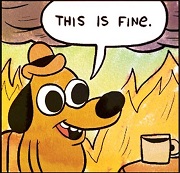|
I wouldn't expect it to have a meaningful impact on the overall situation and if someone wants to blow their brains out over climate change they don't need a doctors office to do it.
|
|
|
|

|
| # ? May 14, 2024 13:36 |
|
Prolonged Priapism posted:Fair enough. You're right that I'm not really knowledgeable about the human cost of the Soviet collapse. No. This is all so, so, so wrong that I do not even know where to start. Should I talk about the destruction of Assyria, where Greeks camping beneath the shattered walls of Nineveh two centuries later didn't even know who built that city which once housed half a million people? Where the now-tribal survivors of Assyria didn't know who they were? Should I talk about the predations of ilk like Ghengis Khan and Tamerlame, who functionally destroyed civilization in asia, levelling cities and slaughtering percentages of the human species? Should I address the fall of eastern Rome, where cities and villages were sacked en-masse by Germanic tribes, who then set themselves up as petty dictators paying taxes to Byzantium by bleeding Roman peasants? Speak of the immediate decline in living standards across Italy during that period? The collapse of the public works networks, failure of sanitation, complete depopulation of major metropolitan centres like Rome due to plague and starvation? The fleeing of peasants from the hinterlands, as brigands raided their holdings to rape and pillage? The destruction of trade and implosion of classical culture? Should I talk about how all that affected the common person in a single lifetime? Should I talk about how we didn't even know almost all of our own ancient history up until the 20th century? Hell, we don't even need to go back centuries to find a good example. I brought up Syria several pages ago. Two decades of a drought worse than any in the past thousand years caused that country to fall into war and anarchy. By any stretch of the imagination, civilization has "collapsed" in Syria right now. That took less than five years to happen. Yeah, sure, people live on. That doesn't mean it was pretty or easy for anyone involved. Rime fucked around with this message at 02:47 on Apr 10, 2016 |
|
|
|
Overflight posted:As bad as this sounds, shouldn't we start heavily pushing for subsidized euthanasia (as in "non only can you do this judgment and pain free whenever you want, we will even pay an institution or next of kin of your choice to do so)? It would alleviate the ones remaining and provide a good option for those who don't want to stick around to see any of this happening. We aren't there yet. There's a decent chance we'll never be there. This isn't an unstoppable, hell-for-leather run towards the world as depicted in The Road. We're talking about climate change as an agent that drives societal, financial, and cultural reorganizing and rework; we're not talking about the entire planet becoming utterly unsuitable for human habitation on an abrupt time frame. You probably need to talk to a therapist.
|
|
|
|
Wanderer posted:You probably need to talk to a therapist. Already did. Response was the usual "We don't know what's going to happen. Please do not do anything stupid". And I will not. Just speaking in hypotheticals.
|
|
|
|
Rime posted:No. This is all so, so, so wrong that I do not even know where to start. Should I talk about the destruction of Assyria, where Greeks camping beneath the shattered walls of Nineveh two centuries later didn't even know who built that city which once housed half a million people? Where the now-tribal survivors of Assyria didn't know who they were? Should I talk about the predations of ilk like Ghengis Khan and Tamerlame, who functionally destroyed civilization in asia, levelling cities and slaughtering percentages of the human species? Could you expand on this?
|
|
|
Rime posted:Hell, we don't even need to go back centuries to find a good example. I brought up Syria several pages ago. Two decades of a drought worse than any in the past thousand years caused that country to fall into war and anarchy. By any stretch of the imagination, civilization has "collapsed" in Syria right now. That took less than five years to happen. You can talk about any or all of those examples, insofar as they inform the current discussion, which is (unproductively, imo) about possible future collapse. I don't disagree that all that poo poo is terrible and sad and an embarrassment. And the future won't be easy. Will it be so bad that we need to seriously consider killing ourselves, like Overflight is talking about? I don't think so. I assume you don't either. The range of possible futures is large. Unprecedented catastrophe is certainly possible. Collapse similar to historical examples is possible, though there are many scenarios, some much worse than others. Maybe the world just sort of limps along as ad-hoc adaptive measures are put in to place scattershot. It's also possible that we get our collective poo poo together and actually make the world better in the face of this crisis. Which scenario is most worth our attention? Our discussion? In a thread called "Climate Change: What is to be Done?"
|
|
|
|
Prolonged Priapism posted:Fair enough. You're right that I'm not really knowledgeable about the human cost of the Soviet collapse. Pre-colonization North America had better wildlife and land management than the modern day US park system. When Europeans came, part of the reason that they were able to survive and so deeply explore is that the land had been managed so well that trees were spaced out wide enough for wagons to pass through, livestock was plentifully managed and encouraged, and soil health had been carefully maintained in order to ensure a consistent scheme of crop growth and renewal. In a generation, most of that was gone from what we would today consider the Eastern Seaboard, either depleted to the point of severely diminishing returns or overplanted so that the forests began to resemble the thickets and clusters that were most familiar to colonists and therefore dramatically less valuable for agrarian culture or exploration. We romanticize collapse as a time for humanity to refine our skills and the most hardy or ingenious to soldier on, but honestly in those tumultuous periods we most as far back as we do forward and there's an unmeasureable amount of suffering involved. Yes, we get through it, but that doesn't rationalize the poor rationale that leads to those situations, or the hubristic belief that we can simply invent our way out of these problems. If anything, the examples that have been cited so far should be doubly terrifying, because those were on a regional or continental scale and humanity survived mostly by accident. We're facing global extinction now, however bad you think things can get is probably very much an underestimation. Mat Cauthon fucked around with this message at 03:45 on Apr 10, 2016 |
|
|
|
|
If /r/collapse is a bunch of survivalists fantasizing about the road warrior style post-apocalypse this thread is a bunch of depressives dreaming about how they and everyone else will finally be able to die
|
|
|
|
Squalid posted:If /r/collapse is a bunch of survivalists fantasizing about the road warrior style post-apocalypse this thread is a bunch of depressives dreaming about how they and everyone else will finally be able to die /r/collapse sounds cool.
|
|
|
|
Squalid posted:If /r/collapse is a bunch of survivalists fantasizing about the road warrior style post-apocalypse this thread is a bunch of depressives dreaming about how they and everyone else will finally be able to die We sound cool.
|
|
|
|
Trust me, the only fun you'd have on /r/collapse is if you own a company that sells survival kits.Grouchio posted:Since the media tends to focus coverage on climate skeptics and deniers far more than the scientific community, what can stop them from doing so? Why do these deniers have so much power over the US sheeple? To go back to this: I think it's simply an attractive prospect. By living in the first world at any point after 1951 or so, you are virtually guaranteed to have been part of the problem at some point, or else you didn't participate in society. The general notion of climate change chips away at several ideas that have become basic bedrock. It dovetails neatly with some of the issues that play into wage stagnation and class warfare. We're just now seeing penetration of the idea that the system's inherently rigged; for more and more people, you were either born on third base or you'll never make it to home plate. The climate change narrative comes in at the end and says, not only that, but now that we've been playing it for a while, it turns out we shouldn't have been playing the game at all. So some people double down. It's easier to believe that climate change is some kind of hippie conspiracy, or liberal attempts at control. That's assuming it isn't simply coming from their religion, or simple reflexive opposition. I've known a couple of people who, if a liberal told them they were on fire, would have a seat and calmly burn to death. Prolonged Priapism posted:The range of possible futures is large. Unprecedented catastrophe is certainly possible. Collapse similar to historical examples is possible, though there are many scenarios, some much worse than others. Maybe the world just sort of limps along as ad-hoc adaptive measures are put in to place scattershot. It's also possible that we get our collective poo poo together and actually make the world better in the face of this crisis. Which scenario is most worth our attention? Our discussion? In a thread called "Climate Change: What is to be Done?" At this point, my current bet's on the "ad-hoc adaptive measures" thing. I figure it's not an accident that Space-X has gone into high gear and half the science periodicals have run articles lately about how relatively affordable it'd be to start a lunar colony. The big money's already looking up and out. Then again, the thrust of my point over the last couple of pages has been that within the boundaries of our predictive ability, there's a lot more going on in preventative and adaptive fields than most seem to be aware of. Some of it's down to mainstream media inadequacy; some's down to people using climate change to fuel their depression or as a springboard to discuss their personal pet hatreds; and some of it's because most of the science is raw and untested. (Today's weirdness: I mentioned the university team that can turn atmospheric CO2 into carbon nanofiber. Now there are applications for carbon nanotubes in computer construction. Can't be too long before somebody puts those two things together. Imagine a MacBook Air made from the air.)
|
|
|
|
Squalid posted:If /r/collapse is a bunch of survivalists fantasizing about the road warrior style post-apocalypse this thread is a bunch of depressives dreaming about how they and everyone else will finally be able to die Do you honestly believe I WANT any of this to happen? Any thoughts and plans that I have (which again, I emphasize are purely hypothetical) have to do with minimizing my suffering in case everything falls apart. I don't want to spent 12 hours a day digging in the dirt. I don't want to have to learn self defense to protect myself against raiders. I simply don't think that my life is worth all that trouble to preserve IF things come up to that point. I fail to see exactly what is your proposal for a more "rational" outlook. I am not particularly attracted to voluntarism (and I live in a country where I don't speak the language anyway), people ITT keep saying how any potential efforts in climate activism will be useful plus any sort of activism in the world today will have potential permanent consequences for my income (for example, every single time I even say words like unions or anything involving the LGBT to my family, they immediately tell me "Don't say those things at work! You might get a reputation! Pretend that you don't have any sort of opinion!"). I am not suicidal, I am simply trying to enjoy life the best I can but I have a horrible time doing so because the notion that billions will suffer casts a dark cloud over it. On worse days it feels more like I am simply staring at a clock waiting for my life to end. Funnily enough my dad is getting a PhD in climate change. I have never asked him anything about it because I fear the results but so far he does not appear to be the least bit concerned. The closest I ever got was mentioning how climate scientists are getting PTSD and depression from their findings to my mom and she shot back with "I was at that climate conference with your father. No one looked depressed to me" (Unfortunately she does not speak English so she would not understand anything being said) and got annoyed at my "persistent pessimism". AceOfFlames fucked around with this message at 10:03 on Apr 10, 2016 |
|
|
|
Climate Change: Subsidizing Euthanasia with Carbon Credits
|
|
|
|
Prolonged Priapism posted:I just have a hard time imagining a random Italian or Brazilian or Indian dude (let alone somebody from Africa) thinking clearly about climate change and doing quite the same sort of hand-wringing. They're aware their lives or their descendants lives may get harder, or a lot harder, but they also know that, well, that's how it's always been. This is just wrong. Awareness of climate change is of course lower in areas with less access to information, but worry about it is higher in poorer places where human dependence on the natural world is more obvious. Latin America and Africa are the most concerned of all.
|
|
|
No, it isn't wrong, because I'm not talking about how concerned they are overall. Like I said in that post, the rest of the world actually has a more clear-eyed view of what's coming, and they're rightfully concerned. I'm talking about the rest of the world probably not being quite so prone to this specific kind of thinking:Overflight posted:Any thoughts and plans that I have (which again, I emphasize are purely hypothetical) have to do with minimizing my suffering in case everything falls apart. I don't want to spent 12 hours a day digging in the dirt. I don't want to have to learn self defense to protect myself against raiders. I simply don't think that my life is worth all that trouble to preserve IF things come up to that point. Which is what a lot of Americans/rich Westerners seem to be falling in to. Some of the people in that survey probably live a life somewhat close to Overflight's nightmare, insta-suicide scenario. I think they'd probably take offense at Westerners looking at their lives and saying "if it ever got to that point for me I'd just kill myself!" They know full well it could be much worse.
|
|
|
|
|
There's a more useful idea to be gleaned from between the two extremes. Americans who get worked up about climate change seem to want to jump straight to living historic on the Fury Road, as opposed to the intermediate, more likely stage where you're forced to abandon many or all of your current creature comforts. The American apocalypse is one where you can't get a steak, it costs too much to drive your car, and you're crammed into a postage stamp of a room with two other people. It is also known as the way in which many people have to live right now.
|
|
|
|
Your fears and anxieties are derived from a chemical imbalance in your brain and have merely fixated upon climate change as a justification for feelings that exist independent of any circumstance. Your worries about fighting off raiders and subsistence farming indicate your specific fears are more directly tied to the tropes of fantasy film and literature than anything indicated by real research on the climate and economy. Here's a wikipedia article covering serious research into the actual impact which should, unless you live in Bangladesh, assuage your fear of impending disaster, if not perhaps your fears for your friend's children. https://en.wikipedia.org/wiki/Economic_impacts_of_climate_change#Distribution_of_impacts
|
|
|
|
Squalid posted:Your fears and anxieties are derived from a chemical imbalance in your brain and have merely fixated upon climate change as a justification for feelings that exist independent of any circumstance. Your worries about fighting off raiders and subsistence farming indicate your specific fears are more directly tied to the tropes of fantasy film and literature than anything indicated by real research on the climate and economy. Sri Lanka estimates that it might actually see a net economic boost due to weather changes in the highlands, especially the dry areas, provided they can handle the relocation impact of Jaffna vanishing pretty much completely beneath the waves and the remainder losing a huge proportion of its clean water. That city (biggest in the Tamil reasons) just can't catch a break.
|
|
|
|
I wish to make a thread that analyses where and when climate change affects the world over via regional ecological crises.
|
|
|
|
Grouchio posted:I wish to make a thread that analyses where and when climate change affects the world over via regional ecological crises. The IPCC AR5 WG2: "Impacts, Adaptation, and Vulnurability" Part B would be a good framework to use to start: http://www.ipcc.ch/report/ar5/wg2/mindex.shtml
|
|
|
|
A staff writer at the Atlantic is crowdsourcing ideas on how to use game theory to formulate large scale responses to climate change: http://www.theatlantic.com/notes/2016/04/game-theory-climate-change/476517/ My gut feeling says that game theory is probably not the best framework to use for a problem of this magnitude, but interesting thought experiment if nothing else.
|
|
|
|
|
I found myself poking around the InsideClimateNews Exxon campaign and checking out the docs they uncovered in the investigation (it sounds like the idea of legal action is being batted around as an eventual possibility), and I knew they were revealing but dddddangquote:3° C global average temperature rise and 10° C at poles if CO2 doubles. Yeah, that sounds about right, so RCP8.5, basically? Mm, go on quote:We project CO2 will reach about 380 ppm by 2000. quote:We estimate now that the doubling time is about 100 years This went to Exxon's president of Research and Engineering in 1981. Also, some interesting stuff on Exxon's public climate site. Some of the docs at the bottom are worth checking out, if only for their exquisite wordsmithing. Part of my job these days is threading through conflicts and choosing words carefully on behalf of people who want to assign blame without actually assuming any themselves; in this Carbon Disclosure Project response they dance right through a minefield of questions and come out sounding both concerned and magnanimous and (most importantly) like a Responsible Business. I would love to know who wrote that and how much they made. Other nuggets: Exxon's own emissions models project right around RCP 4.5 w slightly lower magnitude. If that's conservative, at least it's an answer, and better than "we're looking into it.". They also project that China's emissions will plateau by 2030 and then decline; a nice rebuttal to the folks that position China's coal push as justifying Western inaction on emissions reduction. Overall, they sound pretty bullish on finding ways to make money in this brave new world quote:"BP recognizes that the existing trend of increasing greenhouse gas emissions worldwide is not consistent with limiting the global average temperature rise to 2°C or lower." I've started to reference stuff like this when arguing with skeptics because it raises yet another unanswerable question: what would it take for them to concede this one? Who's left on that side of the fence? Republicans in Congress, right-wing media, couple hundred scientists at best. There's no major government, there's no companies, hell, there's no industry, there's no military. We're cruisng pretty quickly to the point where skepticism will be considered full-on tinfoil-hat territory, and I mean by the public. What's it like working in the Heartland offices now, is it like Downfall? Bruno Ganz as James Taylor? Depressing bit from the Carbon Disclosure Project response: quote:Please explain why you have not conducted any scenario analysis based on a low-carbon scenario rivetz fucked around with this message at 03:17 on Apr 14, 2016 |
|
|
|
I just picked up this guy Hone's e-book, Putting the Genie Back: 2° C Will Be Harder Than We Think". Turns out this guy signed on as Shell's main climate adviser in 2001, in the wake of the Kyoto Protocol meetings. Not a scientist, just an energy wonk, but knows the industry. Again, his perspective is quite firm and appears to be unabashedly endorsed by Shell. In one chapter, he cites MIT's 2009 report on emissions targets extensively, concluding without apparent sarcasm: "In other words, by looking only at 2° C and 4° C scenarios, either it must be 2°C or it's a catastrophe." The next chapter is entitled: "It Really Is Just Physics, Not Ideology And Certainly Not Politics. This, from Big Oil? hahaha o no quote:Exciting new technologies such as LED lighting are purported to reduce energy use, therefore emissions. Today, thanks to LEDs, it's not just the inside of buildings that are lit up at night, but the outsides as well. In cities such as London and New York, entire buildings globe blue and red, lit with millions of LEDs that each use a fraction of the energy of their incandescent counterparts - or would do if incandescent lights have been used to illuminate cityscapes on the vast scale we see today. The response to lighting efficiency has been to consume more energy and therefore increase emissions. Yet again human nature has got us into trouble.  quote:An analysis from Sandia National Laboratories, a US energy research center, looks at this phenomenon and concludes: The result of increases in luminous efficacy has been an increase in demand for energy used for lighting that nearly exactly offsets the efficiency gains essentially 100% rebound in energy use. rivetz fucked around with this message at 07:39 on Apr 14, 2016 |
|
|
|
So I've been reading this thread over the last couple of days, and I have to say it's rather depressing. Strangely enough the clip from Newsroom that was posted a bunch of pages ago hit me the hardest. So I thought i'd add another bit of bad news: a 'freakishly early' spring thaw on Greenland. On a more positive note: it has been said before in this thread, but some people are certainly taking steps to save us from ourselves. While not directly linked to global warming, one that I really like is the Ocean Cleanup Initiative. They plan to remove 42% of plastic from the Great Pacific Garbage Patch by 2030. Cool plans like that give me some hope for the future. Another thing I wondered about is that people in this thread have been saying that electric cars will not help against climate change as long as we still use fossil fuels to generate electricity. I don't think that that's entirely true. As I understand it big power plants are much more efficient than any small combustion engine. Also, electric cars mean you don't need to transport gasoline to thousands of gas stations. I mean, electric cars driving on electricity from fossil fuels are obviously still very bad and only a tiny step forward, but it's still better than cars with a combustion engine. e: another bit of good news: World Bank to spend 28% of investments on climate change projects Martian fucked around with this message at 19:23 on Apr 15, 2016 |
|
|
|
Martian posted:Another thing I wondered about is that people in this thread have been saying that electric cars will not help against climate change as long as we still use fossil fuels to generate electricity. I don't think that that's entirely true. As I understand it big power plants are much more efficient than any small combustion engine. Also, electric cars mean you don't need to transport gasoline to thousands of gas stations. I mean, electric cars driving on electricity from fossil fuels are obviously still very bad and only a tiny step forward, but it's still better than cars with a combustion engine. Saying that something isn't good enough isn't the same as saying we shouldn't do it. Electric vehicles aren't nearly good enough without a massive overhaul of our energy infrastructure, and electric cars themselves can't be deployed on a meaningful scale without a massive overhaul of our transportation infrastructure. People are gloomy because we're starting to realize that we aren't dealing a problem that's fifty years out, we're dealing with a problem that's already happening. So electric cars are cool, and helpful, and will probably reduce emissions over the long run, but it's hard to be optimistic when you realize that the battle you thought you were fighting five or six years ago is already lost.
|
|
|
|
Paradoxish posted:Saying that something isn't good enough isn't the same as saying we shouldn't do it. Electric vehicles aren't nearly good enough without a massive overhaul of our energy infrastructure, and electric cars themselves can't be deployed on a meaningful scale without a massive overhaul of our transportation infrastructure. People are gloomy because we're starting to realize that we aren't dealing a problem that's fifty years out, we're dealing with a problem that's already happening. So electric cars are cool, and helpful, and will probably reduce emissions over the long run, but it's hard to be optimistic when you realize that the bai ttle you thought you were fighting five or six years ago is already lost. I think people underestimate how much electricity electric vehicles use. I think they'll be a great motivator to overhaul our energy systems in place. I don't mind running the fleet on coal if it means we get more reactors sooner.
|
|
|
|
Paradoxish posted:Saying that something isn't good enough isn't the same as saying we shouldn't do it. Electric vehicles aren't nearly good enough without a massive overhaul of our energy infrastructure, and electric cars themselves can't be deployed on a meaningful scale without a massive overhaul of our transportation infrastructure. People are gloomy because we're starting to realize that we aren't dealing a problem that's fifty years out, we're dealing with a problem that's already happening. So electric cars are cool, and helpful, and will probably reduce emissions over the long run, but it's hard to be optimistic when you realize that the battle you thought you were fighting five or six years ago is already lost. I will say this though, that the adoption of electric vehicles will have some significant impacts on the electric infrastructure and will lead to the development of more fundamentally green technologies. I'll explain what I mean: The next big thing in development of industry, logistics and services is going to be automation. I expect that within ten years time we will see a lot of manpower being replaced with automatics, like driving, delivery, cargo transport and public transportation. This has huge implications, because the combination of these technologies makes a lot of sense; we can make up for the faults of electric vehicles with tireless drivers and automatic load handling systems a la Amazon. We will have net efficiency gains, lower transport costs (with electric vehicles at least) and if electric cars can be produced and transported at least somewhat carbon-free this will be a great boon to the environment. But then there's the greater issue: What will automation - not just for transport and logistics but everywhere conceivable - do to our financial system? Capitalism works (somewhat) because people have money to pay for things. If half of everyone loses their jobs to robots (this is actually not unlikely), we can't really invent enough new jobs for them to have busywork to do, and the social safety net of unemployment insurance and such will not be able to compensate for a 50% unemployment rate. Which either leaves a permanent underclass of destitute people, or we wil be forced to adopt a socialist stance and a sort of "citizen's wage" to provide a basic financial back bone to society, financed by heavy taxation or outright public ownership of the means of production. And how will that impact the environment? Well, seeing as capitalism as an economic system is unable to deal with climate change, the fight against climate change almost certainly requires the death of capitalism and a restructuring of our economic culture and understanding and diverting these massive freed resources of manpower and efficiency gains into A: Making all industry green and B: Gigantic international projects against climate change. In essence, our society needs a massive change of political and cultural understanding so it can transition into something that values solidarity and cooperation over massive corporate greed and consumption. Now, do I believe that will happen? Hell no. The people on top, the 1%, the oligarchs, the "elite", whatever you want to call them will not allow this to happen. They have too much to lose, have no incentive in their (non-existent) personal risk in case of climate change, and really truly do not care in the slightest about any and all human suffering that does not directly impact them or their families. Not in any significant way at least. To quote George Carlin: "It's a big club, and you ain't in it". Until most people share my opinion that vast fortunes are fundamentally undemocratic and shouldn't be allowed and that the blame for climate change lies in the hands of the people who benefit the most from it, the people who have all the power in our society to frame the issues through their ownership of the media, the power to truly influence politics, things will absolutely not change to the benefit of the environment. Socio-economic politics is environmental politics. They are completely linked. And until people realise that, meaningful change will not come.
|
|
|
|
A reminder that several public transport systems can be fully automated right now but are not for liability concerns. Your dystopia of everyone being out of a job is a lot farther away than you think.
|
|
|
|
"everyone" out of a job isn't really the problem the problem would be 10 - 100k jobs a month getting automated thats the thing about capitalism, things don't even have to go down, they just have to go up more slowly to cause shitstorms
|
|
|
|
StabbinHobo posted:"everyone" out of a job isn't really the problem At the current rate of income growth, automation isn't the issue, its the coming economic collapse due to the Middle Class shrinking and spending power decreasing. Automation will just enhance these issues.
|
|
|
|
This is an interesting thread. Just wanted to chime in that electric cars are loving stupid, wind and especially solar are a waste of taxpayer dollars, and the only thing that will save us is a concerted effort to push for 80% plus nuclear power world wide. At that point we can look at EVs, as we need to take the low hanging fruit first. Lithium ion batteries and solar panels have ridiculous energy input to output yields. China burns a bunch of diesel (mining) and coal (manufacture) to make these things. Its thermodynamically inefficient and serves to make a bunch of idiots feel better. The externalized economic and environmental costs in most of the "renewable" space is shameful. Not sure if this has been posted yet but here's a good summary: http://bravenewclimate.com/2014/08/22/catch-22-of-energy-storage/
|
|
|
|
oxsnard posted:This is an interesting thread. I'm not going to disagree with you on the facts at least. For this automated electric car scenario to work, I'm assuming advances in battery technology that allows us to make batteries at least somewhat eco-friendly; if we assume the same battery production method as is currently in use all we're really doing is having well-off westernes paying large sums of money to transport local pollution to the battery-producing countries. Which - all inequality aside - accomplishes nothing in the long run and the big picture, since we're all sharing this one atmosphere. But there will be advances in battery technology, hopefully (especially) in making batteries greener. I don't think we can speculate as to what that will look like, though, and certainly not plan for it. A better solution might be alternative to cars; existing road infrastructure replaced by electric trains and trams, and local short range transport being accomplished by a small number of shared automated cab-like vehicles. This has its own issues, but at least it's a feasible way to accomplish people transportation with a minimum of pollution and most importantly CO2. It would set us back to 1920s era transportation for most people though, which would be a big adjustment for most westerners. But hell, transport in the future might be severely limited regardless, so... As for nuclear, you're also not wrong. Good luck convincing everyone else though, I'm willing to bet that will be difficult even when rolling brownouts become an everyday thing.
|
|
|
|
Don't be so optimistic about nuclear. I can understand why people would be so sympathetic towards it- it's not oil, it's not coal, the idea of nuclear tickles the mind about its possibilities (especially in light of possible tech improvements, like breeder reactors or fusion). But I'd really like to emphasize that as a solution it is not permanent. Even if we manage to make a global nuclear transition (a gargantuan if) then uranium is still a non-renewable resource and we would just be kicking the ball down the road, pushing forward the inevitable collapse and downsizing that our civilization needs to undergo. Possible tech advances are not a way out of this because they don't exist right now - believing that they will be around to bail us out seems just a form of faith to me. And further, I suspect that even if these fusion/thorium/breeder reactors come around, there will be some other resource limit that will knock them on their rear end anyway later down the road. Remember that even if the fuel for something like fusion is insanely abundant, what might not be so abundant are the rare metals and minerals that will be required to construct these new reactors (and maintain them). Safety is also an issue. I think people in this thread feel a bit smug with regard to the question of nuclear safety, because this question tends to attract a lot of irrational panic and religious doomsday beliefs. So indeed I agree that the people who claimed Fukushima would wipe out all life around the Pacific in a year were a bit silly to say the least, but that doesn't mean that nuclear is safe. Chernobyl was bad enough in my opinion - the figures of excess deaths range between thousands and hundreds of thousands (a few say millions). I am not trying to say that this is guaranteed to wipe us all out or something but it is very likely that at the very least, nuclearization of world energy means the permanent risk of Chernobyls and Fukushimas, constituting a massive safety risk, meaning nuclear is not safe. Finally gently caress electric cars. The only solution to cars is "into the landfill" I would say. A big problem a lot of green types seem to have is the idea that we can have the society we have right now, except everything will be run using green energy sources. It really is an adorably naive idea. What is far more likely is that before the end of the century, the personal car will be dead, along with every social configuration depending on it (such as suburbia)
|
|
|
|
Isaac0105 posted:Don't be so optimistic about nuclear. I can understand why people would be so sympathetic towards it- it's not oil, it's not coal, the idea of nuclear tickles the mind about its possibilities (especially in light of possible tech improvements, like breeder reactors or fusion). But I'd really like to emphasize that as a solution it is not permanent. Even if we manage to make a global nuclear transition (a gargantuan if) then uranium is still a non-renewable resource and we would just be kicking the ball down the road, pushing forward the inevitable collapse and downsizing that our civilization needs to undergo. Possible tech advances are not a way out of this because they don't exist right now - believing that they will be around to bail us out seems just a form of faith to me. And further, I suspect that even if these fusion/thorium/breeder reactors come around, there will be some other resource limit that will knock them on their rear end anyway later down the road. Remember that even if the fuel for something like fusion is insanely abundant, what might not be so abundant are the rare metals and minerals that will be required to construct these new reactors (and maintain them). If kicking the can down the road for thousands of years (which, given breeders, or even just extracting uranium from the sea for which a pilot project is being built, is a given) is not far enough for now, then nothing is. I also completely disagree that we should look forward to a collapse and downsizing of civilisation. Thinking that collapse is in any way necessary rather than merely a thing that happens if we gently caress up too badly means you're substituting a doomsday cult for environmentalism. quote:Safety is also an issue. I think people in this thread feel a bit smug with regard to the question of nuclear safety, because this question tends to attract a lot of irrational panic and religious doomsday beliefs. So indeed I agree that the people who claimed Fukushima would wipe out all life around the Pacific in a year were a bit silly to say the least, but that doesn't mean that nuclear is safe. Chernobyl was bad enough in my opinion - the figures of excess deaths range between thousands and hundreds of thousands (a few say millions). I am not trying to say that this is guaranteed to wipe us all out or something but it is very likely that at the very least, nuclearization of world energy means the permanent risk of Chernobyls and Fukushimas, constituting a massive safety risk, meaning nuclear is not safe. Chernobyl did not kill a million people, the "study" showing that is basically a back-of-the-envelope calculation of how many people got killed by the collapse of the Soviet Union that attributes those deaths to atoms instead. Deaths per unit energy produced are (even if we assume the higher not completely crazy numbers for Chernobyl are true, i.e. some tens of thousands of cancer deaths) are pretty low for nuclear, being comparable to renewables. If we had a Fukushima every decade that would also be completely ok compared to what we are currently doing. quote:Finally gently caress electric cars. The only solution to cars is "into the landfill" I would say. A big problem a lot of green types seem to have is the idea that we can have the society we have right now, except everything will be run using green energy sources. It really is an adorably naive idea. What is far more likely is that before the end of the century, the personal car will be dead, along with every social configuration depending on it (such as suburbia) US suburbia is stupid and needs some consolidating, but why does all personal transportation ever need to die?
|
|
|
|
Isaac0105 posted:Don't be so optimistic about nuclear. I can understand why people would be so sympathetic towards it- it's not oil, it's not coal, the idea of nuclear tickles the mind about its possibilities (especially in light of possible tech improvements, like breeder reactors or fusion). But I'd really like to emphasize that as a solution it is not permanent. Even if we manage to make a global nuclear transition (a gargantuan if) then uranium is still a non-renewable resource and we would just be kicking the ball down the road, pushing forward the inevitable collapse and downsizing that our civilization needs to undergo. Possible tech advances are not a way out of this because they don't exist right now - believing that they will be around to bail us out seems just a form of faith to me. And further, I suspect that even if these fusion/thorium/breeder reactors come around, there will be some other resource limit that will knock them on their rear end anyway later down the road. Remember that even if the fuel for something like fusion is insanely abundant, what might not be so abundant are the rare metals and minerals that will be required to construct these new reactors (and maintain them). Not to start a nuclear debate in general (even though it is definitely key to any kind of civilization post a green shift in industry), but just for accuracy's sake: Chernobyl wasn't really much worse than Fukushima. WHO estimates increased cancer cases from nuclear pollution at around 4000, and total worker deaths/shortened lives including cleanup crews from the sovjet union were almost certainly less than 6000. Estimates of hundreds of thousands and millions are complete bunk, and I say that as a person born just before the disaster in the radioactive pollution zone. No, I'm not kidding. I mean, not to use wikipedia as a source, but there are a bunch of citations here: https://en.wikipedia.org/wiki/Deaths_due_to_the_Chernobyl_disaster Chernobyl is easily the worst nuclear plant accident in the world, but compared to something like the worst renewable power accident in the world that killed 171 000 people, Chernobyl really was nothing significant at all: https://en.wikipedia.org/wiki/Banqiao_Dam Nuclear energy has a very bad PR problem that you're a great example of, but it is by a ridiculous, completely ludicrously overwhelming margin the safest method of power generation known to man. France generates much more than half of its electricity from nuclear. It's not exactly a nuclear wasteland, France. It gets even more mindblowing when you consider that the only significant nuclear accidents have been ancient, terribly designed plants from the 60s. It's still the safest way to produce electricity. Nuclear is very safe, and is completely and utterly necessary for any real attempt at combatting climate change.
|
|
|
|
"A given?" Please. Right now even human survival over the next century isn't a given, let alone an unprecedented shift in energy production which (according to you) is a given because of a pilot project and an underdeveloped technology. All I am calling for is realism. Even if something like fusion was already well developed (say we had a few relatively safe working reactors that are producing more energy than it takes to run them) I would say that the transition would be very far from a given. Let alone in our actual situation. I'm not sure what connotation "looking forward to collapse" is supposed to have. Rest assured I meant that we should look forward to it in the sense that one looks forward to a big disaster that it might be a good idea to prepare for, not as some kind of fun adventure that we should embrace because it will take us back to the golden age of hunter-gatherer tribes. And finally, the rise and fall of civilization is not a morality play. What causes a fall is not "good people" "loving up badly" but a set of systemic factors which sweep away all the people caught up in it. The fall of civilization will not be prevented by "good people who do what is necessary". Maybe delayed, maybe softened, but not prevented, trust me. My specific take on safety is this - supposing that I did agree with you and blowfish on the necessity and the inevitability of a global transition to nuclear, I would still highly prefer if there existed this swarm of highly agitated nuclear pessimists who yell "safety" into the ears of everyone responsible for the construction and maintenance of nuclear reactors. To pressurize them into keeping to their safety standards, you see. Failing this, please don't expect nuclear to actually be the "safest method of power generation".
|
|
|
|
Isaac0105 posted:"A given?" Please. Right now even human survival over the next century isn't a given, let alone an unprecedented shift in energy production which (according to you) is a given because of a pilot project and an underdeveloped technology. All I am calling for is realism. Even if something like fusion was already well developed (say we had a few relatively safe working reactors that are producing more energy than it takes to run them) I would say that the transition would be very far from a given. Let alone in our actual situation. If we build breeders, or thorium reactors, or extract uranium from the sea, or develop fusion reactors, then those technologies could power our current civilisation beyond the scope of any long term policies we currently are or want to implement, i.e. for long enough. You will also note that the first reactor to over power any electrical equipment was a breeder reactor (EBR-1), that Russia just started up a commercial-scale breeder, and that India is currently building a commercial-scale thorium reactor prototype (bog standard CANDUs could already burn Thorium as an alternative fuel anyway if anyone bothered). It's not like doing this poo poo is impossibly hard. quote:I'm not sure what connotation "looking forward to collapse" is supposed to have. Rest assured I meant that we should look forward to it in the sense that one looks forward to a big disaster that it might be a good idea to prepare for, not as some kind of fun adventure that we should embrace because it will take us back to the golden age of hunter-gatherer tribes. Why do you think the fall of civilisation is an inevitable event that might as well be physical law, is what I'm asking. quote:My specific take on safety is this - supposing that I did agree with you and blowfish on the necessity and the inevitability of a global transition to nuclear, I would still highly prefer if there existed this swarm of highly agitated nuclear pessimists who yell "safety" into the ears of everyone responsible for the construction and maintenance of nuclear reactors. To pressurize them into keeping to their safety standards, you see. Failing this, please don't expect nuclear to actually be the "safest method of power generation". The vast majority of the world's nuclear power plants are lovely cold war leftovers operating past their original design lifespan. They aren't getting replaced in part because new plants have a much harder time getting approved despite being much safer. Still, even with a fleet of hand-me-down ancient reactors, and literal Chernobyl style RBMKs still operating, nuclear has an excellent safety record (or, depending on how you look at it, a less terrible safety record than everything else).
|
|
|
|
Isaac0105 posted:"A given?" Please. Right now even human survival over the next century isn't a given, let alone an unprecedented shift in energy production which (according to you) is a given because of a pilot project and an underdeveloped technology. All I am calling for is realism. If you seriously think the human race may not last another 100 years, you and realism aren't in the same boat.
|
|
|
|
blowfish posted:If we build breeders, or thorium reactors, or extract uranium from the sea, or develop fusion reactors, then those technologies could power our current civilisation beyond the scope of any long term policies we currently are or want to implement, i.e. for long enough. If we build breeders, if we do thorium, if this and if that (and if some more) and then it's also an if that it will "power our current civilization for long enough". Reactors require plenty of rare resources to construct, what if we run out of those, even if we have enough reactor fuel? What if "we" (whoever we is supposed to be) cannot ensure a global scale transition to nuclear? It's not like "we" are living under some kind of highly organized and socially responsible world government, you know. If you look at history, civilizations have a habit of falling. I already posted about this once - it can take many forms. I think it would be extreme to say they are all destined to fall all the way back to the stone age, but that's not really what I am arguing. I am saying that progress doesn't last forever, that some kind of fall will take place. The fall will be towards a society with a lower degree of complexity, what exactly it will be, I don't know (there's different scenarios and endpoints). And about the last thing you said - when are you expecting this consciousness change towards a new nuclear age to take place? Techno-optimists like you always seem to be banking on some decisive moment when civilization will suddenly see the light and undergo some epic scale transformation to a bright new tomorrow. Maybe 20 years for now we will have even more run down cold war leftover reactors and still no fusion in sight? Do you really think that is less likely than a world dotted with fusion and breeder reactors? Civilizations really don't have these kinds of unprovoked transformative moments - the only time they transform at all is when they get a kick in the balls so fierce that the sheer pain shatters its delusions, making it scramble to adapt in chaotic and unpredictable ways.
|
|
|
|

|
| # ? May 14, 2024 13:36 |
|
Isaac0105 posted:If we build breeders, if we do thorium, if this and if that (and if some more) and then it's also an if that it will "power our current civilization for long enough". Reactors require plenty of rare resources to construct, what if we run out of those, even if we have enough reactor fuel? What if "we" (whoever we is supposed to be) cannot ensure a global scale transition to nuclear? It's not like "we" are living under some kind of highly organized and socially responsible world government, you know. Please provide any evidence beyond "well what if it happened" for us running out of raw materials before building some thousands of reactors. Note that I pointed out several examples of things that already exist or are currently in build, so again, this is not purely hypothetical. Your argument that we might not ensure a global nuclear rollout applies to every other global scale action, such as a global renewable rollout. What you're saying is "poo poo is hosed, and it's hard to unfuck poo poo, so let's just throw up our hands in despair and wait for the end times". I am saying we lose nothing by trying, so we might as well get to it and start fixing poo poo. quote:If you look at history, civilizations have a habit of falling. I already posted about this once - it can take many forms. I think it would be extreme to say they are all destined to fall all the way back to the stone age, but that's not really what I am arguing. I am saying that progress doesn't last forever, that some kind of fall will take place. The fall will be towards a society with a lower degree of complexity, what exactly it will be, I don't know (there's different scenarios and endpoints). quote:And about the last thing you said - when are you expecting this consciousness change towards a new nuclear age to take place? Techno-optimists like you always seem to be banking on some decisive moment when civilization will suddenly see the light and undergo some epic scale transformation to a bright new tomorrow. Maybe 20 years for now we will have even more run down cold war leftover reactors and still no fusion in sight? Do you really think that is less likely than a world dotted with fusion and breeder reactors? Civilizations really don't have these kinds of unprovoked transformative moments - the only time they transform at all is when they get a kick in the balls so fierce that the sheer pain shatters its delusions, making it scramble to adapt in chaotic and unpredictable ways. Well, when are you expecting the global sustainable rollout of enough renewable energy to actually deal with climate change? There might be more people who have a positive opinion of solar panels and wind turbines, but when you reach practical limits that doesn't help.
|
|
|

































 I CANNOT EJACULATE WITHOUT SEEING NATIVE AMERICANS BRUTALISED!
I CANNOT EJACULATE WITHOUT SEEING NATIVE AMERICANS BRUTALISED!

